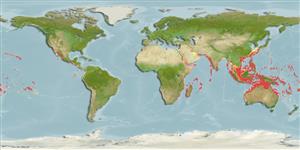Environment: milieu / climate zone / depth range / distribution range
экология
морской ассоциированный с рифами; пределы глубины 0 - 122 m (Ref. 1602). Tropical; 34°N - 32°S, 26°E - 77°W
Indo-Pacific: East Africa to Hawaii and the Easter Island, north to southern Japan south to Lord Howe Island. Eastern Central Pacific: Panama, Revillagigedo Islands, Clipperton Island, Cocos Island, and Malpelo Island (Ref. 9275).
Size / Вес / Возраст
Maturity: Lm ? range ? - ? cm
Max length : 80.0 cm TL самец/пол неопределен; (Ref. 2334); common length : 60.0 cm TL самец/пол неопределен; (Ref. 55763)
Краткое описание
определительные ключи | морфология | морфометрия
колючие лучи спинного плавника (общее число) : 8 - 12; членистые (мягкие) лучи спинного плавника (общее число) : 24 - 27; колючие лучи анального плавника: 0; членистые (мягкие) лучи анального плавника: 26 - 29. Occurs in three basic color phases: uniformly brown to green, mottled brown to green, or uniformly yellow. First dorsal fin consists of a series of isolated spines, followed by a second dorsal fin consisting of rays. The second dorsal fin is shaped like the anal fin and is found directly above it. A black maxillary stripe usually present, but may be reduced; dorsal and anal fins light, but with a dark basal bar; caudal fin usually with two round black spots; a black spot at the base of each pelvic fin (Ref. 9825).
Found in clear, shallow water (Ref. 9275), in rocky and coral areas of protected and seaward reefs (Ref. 1602, 58302, 58534, 58652). Benthopelagic (Ref. 58302). Feeds on small fishes and shrimps (Ref. 9275). A slow-moving fish relying partly on stealth and camouflage to sneak up on unsuspecting prey. Often darts down vertically on its prey. Usually solitary (Ref. 48635). Minimum depth reported taken from Ref. 128797.
Life cycle and mating behavior
половая зрелость | размножение | нерест | икра | Fecundity | личинки
Oviparous, gonochorous, with pelagic eggs (Ref. 101194).
Fritzsche, R.A., 1984. Aulostomidae. In W. Fischer and G. Bianchi (eds.) FAO species identification sheets for fishery purposes. Western Indian Ocean fishing area 51. Vol. 1. (Ref. 3309)
Статус Красного Списка МСОП (Ref. 130435: Version 2024-1)
Угроза для людей
Harmless
Использование человеком
рыболовство: не имеет хозяйственного значения; аквариум: коммерческий
дополнительная информация
инструменты
Специальные отчеты
Скачать в формате XML
ресурсы в Интернет
Estimates based on models
Preferred temperature (Ref.
123201): 24.2 - 28.9, mean 27.7 °C (based on 1234 cells).
Phylogenetic diversity index (Ref.
82804): PD
50 = 0.7500 [Uniqueness, from 0.5 = low to 2.0 = high].
Bayesian length-weight: a=0.00059 (0.00036 - 0.00097), b=3.25 (3.10 - 3.40), in cm total length, based on LWR estimates for this species & (Sub)family-body (Ref.
93245).
Trophic level (Ref.
69278): 4.2 ±0.75 se; based on food items.
Fishing Vulnerability (Ref.
59153): Moderate to high vulnerability (52 of 100).
Nutrients (Ref.
124155): Calcium = 46.7 [25.3, 85.6] mg/100g; Iron = 0.785 [0.429, 1.444] mg/100g; Protein = 18.4 [17.3, 19.6] %; Omega3 = 0.11 [0.06, 0.22] g/100g; Selenium = 75.2 [39.1, 159.2] μg/100g; VitaminA = 38.1 [14.0, 106.1] μg/100g; Zinc = 0.891 [0.598, 1.324] mg/100g (wet weight);
